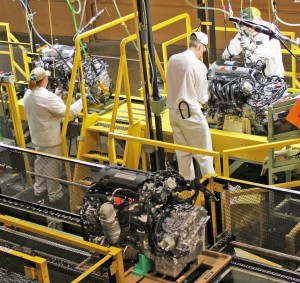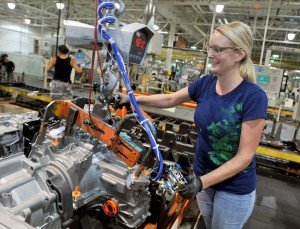
Honda's relationship with its suppliers is the best in the auto industry, according to a recent survey. Toyota tied for the top spot.
When Henry Ford built his massive rouge assembly complex near Detroit, he’d ship in sand and iron ore at one end, then truck out fully assembled vehicles at the other. But that era is long gone, and these days, manufacturers are highly dependent on suppliers who provide a major share of the parts and components that go into a modern vehicle.
But how well suppliers and automakers work together varies widely, and a new study finds that Toyota and Honda have the strongest relationship with U.S. parts suppliers while the situation has actually deteriorated when it comes to Detroit’s Big Three.
Toyota Motor Corp. and Honda Motor Co. topped the list, according to the 15th annual Automotive OEM Supplier Working Relations Index, a study produced by Planning Perspectives, Inc., in Birmingham, Michigan. It was the fifth year in a row the two Japanese makers led the industry.
Ford Motor Co. was a distant third, the index indicated, while General Motors Co. and Fiat Chrysler Automobiles NV sank to the bottom – though they tied the other major Japanese manufacturer, Nissan Motor Co.
The study is about more than just bragging rights – and results in more than an invitation to a supplier’s summer barbecue. Better relations typically result in reduced costs.

Ford was third when it came to what automaker had the best relationship with auto suppliers. They were to top Big Three maker in the survey.
According to John Henke, the president of Planning Perspectives, GM could have saved as much as $750 million last year if it showed the same improvement in supplier relations as Toyota and Honda. Combining GM, Ford, Fiat Chrysler and Nissan, he added, the saving would have climbed by an additional $1.7 billion in operating profits.
Suppliers also lose out, according to Henke, who noted that they may not be willing to invest what’s necessary to take advantage of booming auto sales “because they don’t know what’s going to happen tomorrow.”
(Cheap cars aren’t boring cars. For more, Click Here.)
Shortages have actually created problems with vehicle production over the last several years.
The Supplier Working Relations Index was based on interviews with hundreds of industry parts and component manufacturers on a variety of issues impacting their business with the six largest automakers operating in the U.S. market.
Carmakers frequently talk about the need to improve those relations. GM, in particularly, has called that one of its top priorities, last autumn launching the Supplying Communities Together initiative, among other efforts.
(Click Here for details Nissan’s autonomous vehicles coming in 2020.)
“At GM we take relationships with our business partners very seriously,” Global Purchasing Director Steve Kiefer said in a statement. “While there is more work to do, we have set clear objectives and implemented tools to achieve mutual business goals while building strong relationships between GM and our supplier partners.”
The study did not include German makers Mercedes-Benz, BMW and Volkswagen, all of which have manufacturing operations in the U.S., albeit at a smaller scale. Were they included, said Henke, they would have done even more poorly than Nissan and the Detroit Big Three.
(To see why Consumer Reports calls the Tesla Model S “undriveable,” Click Here.)
The rest of the industry, said the researcher, needs to follow the lead of Toyota and Honda because they “clearly understand the value of strong supplier relations.”

First we need to define supplier relationships before we can make any sense out of the statistics or claims in this story.
I have had Honda dealers tell me that Honda is much better than other brands this dealership sells when it comes to parts and service. That means that Honda tries to make the dealer’s life easier and maintain high customer satisfaction compared to other auto makers who make life miserable for dealership parts and service personnel. This difficulty is typically reflected is consumer dissatisfaction.
The Big Three still wield a lot of power and suppliers know this. If a supplier wants the contract they often need to invest significant capital to engineer the component even if they do not actually get the contract, because the Big Three as well as some other auto makers are outsourcing a lot of their engineering.
Then we have the Big Three mentality issues. They believe that suppliers should only make 5% profit on components and that they should finance the auto makers by waiting as much as 300 days for payment of goods delivered. In this day and age few companies can exist on a net 5% profit, invest in new tech, perform free engineering for the auto makers and then cut their prices each year of the contract – as required, while waiting 90+ days for payment.